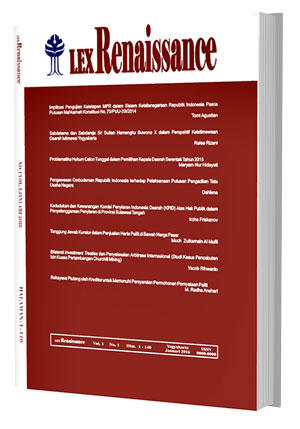Main Article Content
Abstract
The eradication of criminal acts of narcotics has been carried out through a judicial process with the regulation of Law Number 35 of 2009 on Narcotics as a guideline for law enforcement. However, in practice, there are still problems, especially for judges in considering a fine sentence which is regulated specifically with a high enough limit. This study aims to determine the judges’ considerations in imposing a fair decision against a special minimum fine in narcotics crime. The research method used is normative-empirical based on statutory law material adjusted to the facts of its application in the judiciary, with juridical normative and empirical juridical approaches. The results of the research found that the special minimum provisions for fine sentences that were quite high were an obstacle for judges in considering the amount of fines to be imposed on the defendant, so that judges tended to impose the amount of fines according to the specific minimum limit of fines, although in implementing the verdict the convict preferred to serve imprisonment as an alternative to fines that cannot be paid. This phenomenon makes the application of fines in judges’ decisions inefficient, especially in the absence of regulations in the Narcotics Law regarding coercion in the context of the application of the penalty itself.
Keywords
Article Details
Authors who publish with this journal agree to the following terms:
a. Authors retain copyright and grant the journal right of first publication with the work simultaneously licensed under a Creative Commons Attribution License that allows others to share the work with an acknowledgement of the work's authorship and initial publication in this journal.
b. Authors are able to enter into separate, additional contractual arrangements for the non-exclusive distribution of the journal's published version of the work (e.g., post it to an institutional repository or publish it in a book), with an acknowledgement of its initial publication in this journal.
c. Authors are permitted and encouraged to post their work online (e.g., in institutional repositories or on their website) prior to and during the submission process, as it can lead to productive exchanges, as well as earlier and greater citation of published work (See The Effect of Open Access).References
- Buku
- Atmasasmita, Romli, Sistem Peradilan Pidana (Criminal Justice System) Perspektif Eksistensialisme Dan Abolisionalisme, Bina Cipta, Jakarta, 1996.
- Makarao, Mohammad Taofik, Pembaharuan Hukum Pidana Indonesia, Cetakan Pertama, Kreasi Wacana, Yogyakarta, 2005.
- Moeljatno, Kitab Undang-Undang Hukum Pidana, Cetakan Keduapuluh Tujuh, Bumi Aksara, Jakarta, 2008.
- Nababan, Panda dan R. M. Suripto (Penyunting Diskusi Pemikir Hukum Indonesia), Menangkap Rasa Keadilan Masyarakat oleh Penegak Hukum, Cetakan I, Yayasan Keadilan, Jakarta, 1988.
- Sujono, AR. dan Bony Daniel. Komentar dan Pembahasan Undang-Undang Nomor 35 Tahun 2009 tentang Narkotika. Sinas Grafika, Jakarta, 2013.
- Waluyo, Bambang, Penelitian Hukum Dalam Praktek, Sinar Grafika, Jakarta, 1996.
- Internet
- Indra, Yogi, “Pengertian Sistem Peradilan Pidana Menurut Para Ahli Beserta Unsur-Unsurnya”, https://www.academia.edu/36002666/PENGERTIAN_ SISTEM_PERADILAN_PIDANA_MENURUT_PARA_AHLI_BESERTA_ UNSUR-UNSURNYA, diakses tanggal 28 Februari 2020.
- Peraturan Perundang-Undangan
- Undang-Undang Republik Indonesia Nomor 48 Tahun 2009 Tentang Kekuasaan Kehakiman, Lembaran Negara Republik Indonesia Tahun 2009 Nomor 157.
- Undang-Undang Republik Indonesia Nomor 35 Tahun 2009 Tentang Narkotika, Lembaran Negara Republik Indonesia Tahun 2009 Nomor 143.
- SEMA Nomor 3 Tahun 2015 tentang Pemberlakuan Rumusan Hasil Rapat Pleno Kamar Mahkamah Agung Tahun 2015 Sebagai Pedoman Pelaksana Tugas Pengadilan.
- Pedoman Jaksa Agung Nomor 3 Tahun 2019 tentang Tuntutan Pidana Perkara Tindak Pidana Umum.
References
Buku
Atmasasmita, Romli, Sistem Peradilan Pidana (Criminal Justice System) Perspektif Eksistensialisme Dan Abolisionalisme, Bina Cipta, Jakarta, 1996.
Makarao, Mohammad Taofik, Pembaharuan Hukum Pidana Indonesia, Cetakan Pertama, Kreasi Wacana, Yogyakarta, 2005.
Moeljatno, Kitab Undang-Undang Hukum Pidana, Cetakan Keduapuluh Tujuh, Bumi Aksara, Jakarta, 2008.
Nababan, Panda dan R. M. Suripto (Penyunting Diskusi Pemikir Hukum Indonesia), Menangkap Rasa Keadilan Masyarakat oleh Penegak Hukum, Cetakan I, Yayasan Keadilan, Jakarta, 1988.
Sujono, AR. dan Bony Daniel. Komentar dan Pembahasan Undang-Undang Nomor 35 Tahun 2009 tentang Narkotika. Sinas Grafika, Jakarta, 2013.
Waluyo, Bambang, Penelitian Hukum Dalam Praktek, Sinar Grafika, Jakarta, 1996.
Internet
Indra, Yogi, “Pengertian Sistem Peradilan Pidana Menurut Para Ahli Beserta Unsur-Unsurnya”, https://www.academia.edu/36002666/PENGERTIAN_ SISTEM_PERADILAN_PIDANA_MENURUT_PARA_AHLI_BESERTA_ UNSUR-UNSURNYA, diakses tanggal 28 Februari 2020.
Peraturan Perundang-Undangan
Undang-Undang Republik Indonesia Nomor 48 Tahun 2009 Tentang Kekuasaan Kehakiman, Lembaran Negara Republik Indonesia Tahun 2009 Nomor 157.
Undang-Undang Republik Indonesia Nomor 35 Tahun 2009 Tentang Narkotika, Lembaran Negara Republik Indonesia Tahun 2009 Nomor 143.
SEMA Nomor 3 Tahun 2015 tentang Pemberlakuan Rumusan Hasil Rapat Pleno Kamar Mahkamah Agung Tahun 2015 Sebagai Pedoman Pelaksana Tugas Pengadilan.
Pedoman Jaksa Agung Nomor 3 Tahun 2019 tentang Tuntutan Pidana Perkara Tindak Pidana Umum.




